A Learning Content Management System (LCMS) is an integrated platform for publication, distribution, and multi-user management. The integrated database structure of LCMS facilitates the handling, storing, and reusing of online content.
It enables administrators to coordinate, plan, and manage online training sessions. This will also help in assessing, testing, and keeping an eye on registrants. These platforms help the instructional designers to store and create course materials.
The learners or students may use them to register for training, view course schedules, keep track of transcripts, and take assessments.
An LCMS is different from a standard LMS (Learning Management System). LCMS focuses on more than just delivering and managing courses. It also features powerful authoring tools.
This makes LCMS easy to incorporate AI, multimedia, and adaptive learning technologies. These features significantly speed up the e-learning creation process.
It is expected that LCMS will have a growth from USD 22.1 billion to USD 51.9 billion at the end of 2028. The Compound annual growth rate(CAGR) is projected to be about 18.6% in the given period.
LCMS platforms provide solutions for businesses, from universities to training corporates to optimize their development of digital content and learning management.
Schools, colleges, and universities use LCMS platforms to test courses and multimedia materials. Learning content management system development helps them to create educational content, which can be arranged properly and delivered efficiently to the learners.
LCMS helps educational institutions by facilitating instructor collaboration and supporting different learning styles. Moreover, LCMS allows course management, a feedback system, grading systems, and learning path creation.
Learning content management system development helps professionals in content creation and also in managing and distributing online content. The development of online training, distributing it, and reusing it is also facilitated by a learning content management system. This helps in maintaining efficiency and consistency. Organizations, on the other hand, can monitor student progress, their engagement, and thus maximize the effectiveness of learning efforts. Learning Content management sysytem development also helps in compliance training, public outreach, civic education, and onboarding new hires.
For Instructional designers, a learning content management system allows them to store, create, publish, audit, and manage the functionality of e-learning. Webinar and live course materials for training can be created and delivered with the help of LCMS platforms for learners and subject matter experts. These will help them to have feedback and monitor their progress while utilizing them and interacting with the instructional materials.
Digital education solutions that are scalable and customized are made possible by an effective LCMS platform, which guarantees learners’ engagement, content distribution, and course development.
Learning content management system development helps in centralizing content for learning materials, which makes it easier to manage, find, and access materials. This also integrates built-in templates and authoring tools, making it possible to develop and update educational materials easily. By making learning materials, training programs, and courses reusable. LCMS, in a way, helps in saving time and resources. LCMS makes sure that it is possible for everyone to track and manage the most updated version of the learning content. This is done by tracking and managing different versions.
Learning content management system development includes a number of media formats, like videos, interactive simulations, and evaluations. This helps in creating personalized learning paths, so as to meet the requirements of each individual learner. These functions help students to improve engagement and retention of information.
Learning content management system development helps in automating content management and delivery, the reuse, and streamlining of content, speeding up the creation and implementation of training initiatives, and helping businesses to shift quickly to the changing needs of the market. All these functions of LCMS help in time and cost savings.
Learning content management system development is suitable for all kinds and sizes of businesses because of its ability to manage high content volumes and also large number of learners. As the organizations change and develop, LCMS may change to meet the evolving demands of the training.
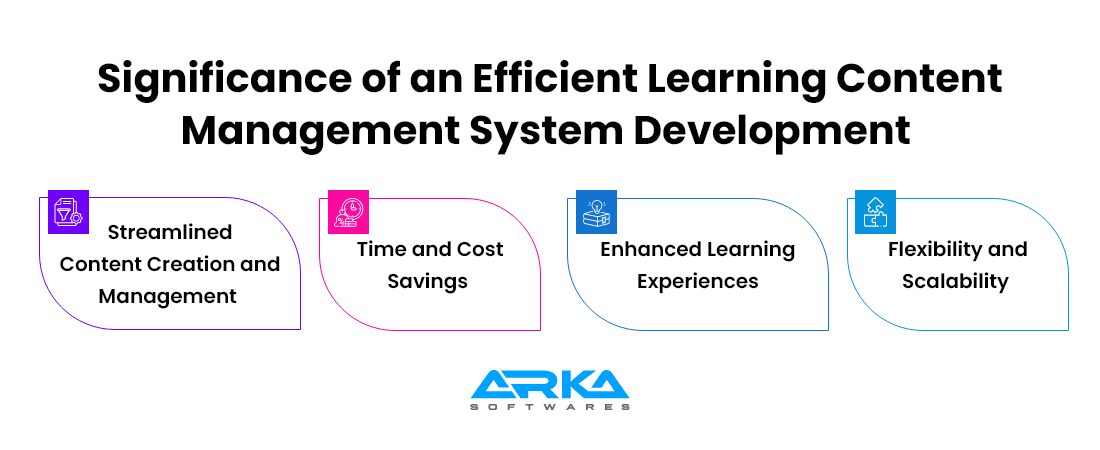
Investing in a learning content management system development helps in automation, reduces costs, optimizes tracking, and results in better learning.
Learning content management system development eliminates the need for in-person sessions and meetings by making the reusable digital content and thus removing the need for new training materials for various courses. This helps in lowering the cost of development and creation of content.
Learning content management system development enables and supports multilingual content which are standardized for audiences throughout the world. The development of engaging and personalized content will lead to the retention of information among the learners.
Learning content management system development supports powerful techniques of analytics and reporting. These functions are used by businesses for monitoring the progress of learners and helping them recognize the areas for development for the success of the training programs.
The most effective learning content management system development assists organizations in their education programs and training with the help of AI and automation.
Docebo is an AI-powered platform, known for its capabilities for creating captivating e-learning content and task automation. This involves classification and translation of content. This is an excellent and suitable option for an organization’s complicated training requirements.
This is available on apps and websites. This platform specializes in providing individualized training experiences. This is suitable for organizations looking for staff development and customer education.
The LearnUpon platform is unique in itself as it manages functions like complicated training for a number of partners, departments, and clients. All these functions on a single platform. It is suitable for organizations that need to deliver impactful training experiences.
This platform supports collaborative learning. This helps businesses to make use of the internal team’s experience in delivering training and content creation. It is suitable for organizations that prioritize reducing administrative burdens and increasing fill rates.
This is a cloud-based LCMS. It provides a number of tools for the delivery of training and creating content. This helps in employee engagement and focused training by integrating with other business systems. It is suitable for organizations that need to swiftly implement training while maintaining compliance.
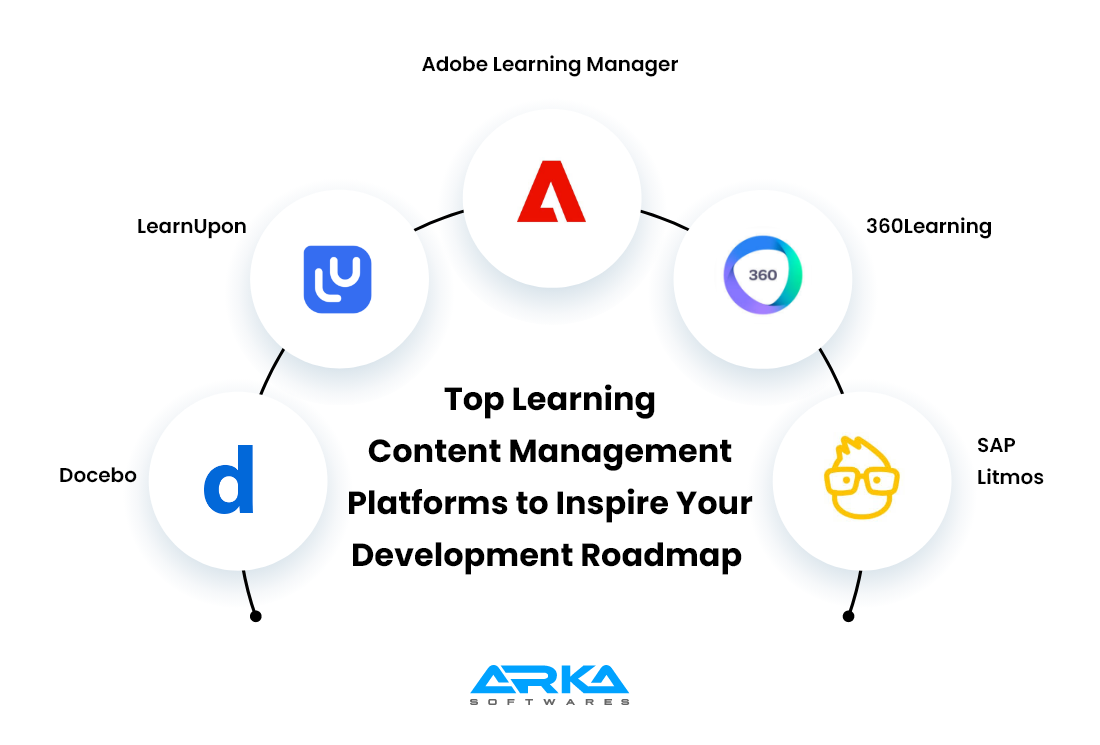
The Features of LCMS may vary depending on the needs of educational institutions and the objectives of the organizations. The features listed below will guide the creation of an effective and thorough system infrastructure for LCMS development.
Learning content management system development must provide a range of features like content creation, interactive curriculum, content distribution, and personalized learning.
Learning content management system development helps instructional designers and educators by providing them with tools for editing and creating learning content. This helps them to produce captivating digital learning resources which include templates, prebuilt content, and support several media formats such as audio, video, photos, and text.
Curriculum management can be used to establish learning objectives and adaptive learning paths with the help of learning content management system development. This enables structuring and arranging learning tracks, modules, and courses in a logical manner.
A centralized content library in learning content management system development can be very useful in storing a variety of educational resources. These can be related to videos, presentations, PDFs, slides, and interactive content. This comes along with the arrangement, which offers classification, labeling, and robust search features. This will help the learners and educators to find and compose tasks easily.
The functions of this module in learning content management system development help in instructor-reviewed materials and auto-graded test assessments. A number of question formats are supported by this module, like short answer, multiple choice, true/false, and coding elements. This helps learners to understand and evaluate effectively.
Adaptive engine in learning content management system development comprises AI and learner analytics. This helps to customize the learner’s content as per their preferences, performance, and behavior. These enable individualized learning to be more effective.
This module in learning content management system development incorporates various features like badges, points, and leaderboards. This helps in achieving engagement by making learning fun. This also promotes healthy competition by recognizing the learners’ achievements and making it more interactive.
The Multimedia Integration tool in learning content management system development helps in combining educational materials with audio, images, video, and animations. This helps in the educational process by combining visual and auditory learners.
Multilingual support tools in learning content management system development target global and diverse learners. This provides curriculum in several languages for institutions and organizations. Integrated localization tools make the translation easy and also modify content as per the geographical areas.
This tool for learning content management system development contains an AI engine that makes recommendations for lessons, courses, classes, or extra content. This is achieved by examining the learner’s past activity, preferences, and behaviors. This helps in improving topic exploration and continuity of learning.
The innovation in LCMS platform has helped in making it modern and advanced. It has a range of features like Live coding simulations, drag-and-drop methods, AR/VR, and 3D model-based modules. These modules give support to technical and visual learning materials. This improves experimental learning, memory, and retention of the learners.
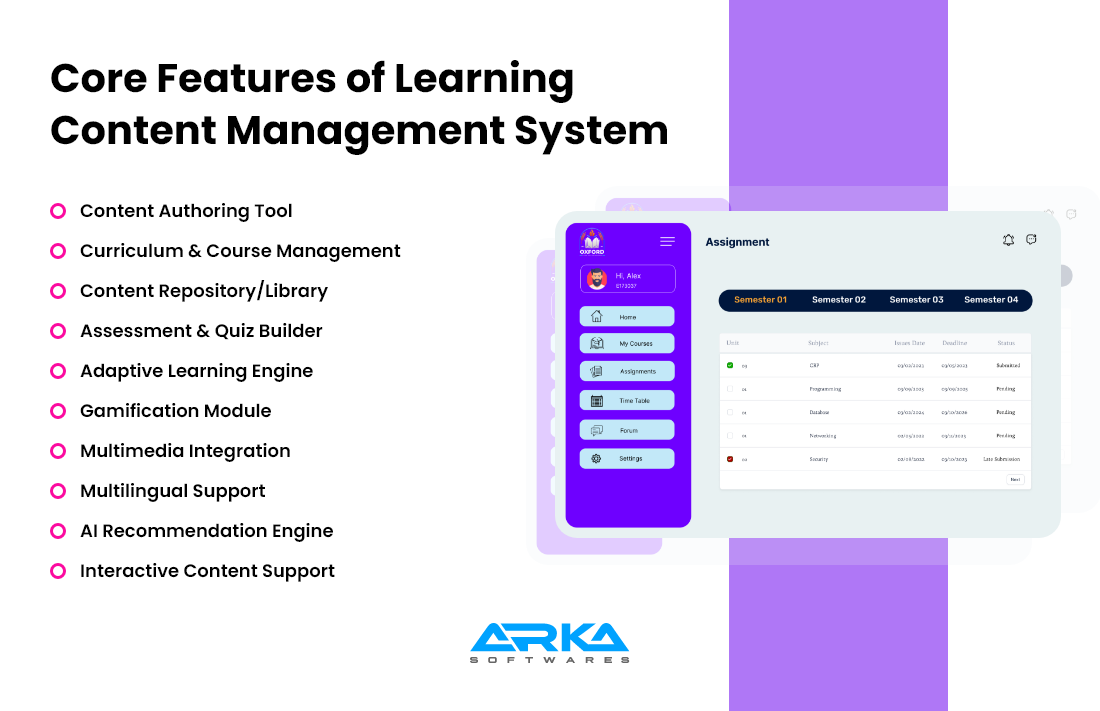
Role- and responsibility-based user management guarantees structured learning, safe access, and an effective administration process inside the LCMS platform.
This tool for learning content management system development provides learners with the functions of creating and managing their profiles. This includes functions for monitoring their learning history, viewing registered courses, and setting preferences like language and their learning goals. These functions help in structured and personalized learning.
A dedicated dashboards are provided to the instructors, where they can arrange, upload, update, and edit their learning courses. With the help of this tool in learning content management system development, instructors can track the students’ engagement parameters and their performance. They can also provide support and feedback to the learners.
The admin dashboard has total control over the backend system of the platform. Admins are responsible for the smooth operation of the platform activity. Admins have the power to handle user accounts, system settings, and roles and permissions.
The features of this tool in learning content management system development help in arranging learners’ courses, groups, or classes. This is perfect for institutional and corporate training. Instructors can control class-specific settings and assign roles and access content for effective communication.
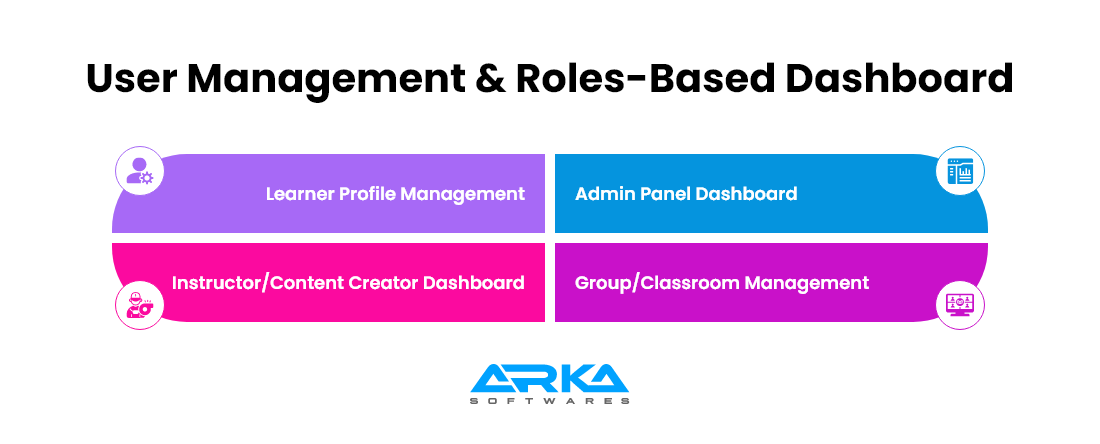
For any LCMS platform that wants to monitor learners’ performance, facilitate data-driven learning, and generate insights must have analytic tools.
This tool for learning content management system development offers a very advantageous function of real-time dashboards. This is helpful in monitoring real-time progress of a learner by displaying parameters like time spent on each class, course completion rates, and engagement levels. This helps educators to track the progress reports of the learners and identify individuals who might need more assistance.
This tool helps in asses the performance of both groups and individuals as per their learning outcomes and range of their skills. This enables educators to identify areas for improvement, track competency growth, and highlight the top performers.
This helps users to generate and export detailed reports about attendance, performance, and usage of content. This can be used to analyze patterns and enhance training and decision-making at scale.
Connecting with peers and instructors is made easier with the help of effective communication tools, which also improve teamwork and create a positive online learning environment.
This feature provides deadlines and feedback, along with in-app alerts. Also, provides email and SMS announcements.
This promotes a collaborative environment and teamwork. This enables peer-to-peer communications and instructor-learner communications.
Allows guardians to see the progress reports to monitor their child’s development. This tool also sends notifications, alerts to the guardians and assists with learning objectives.
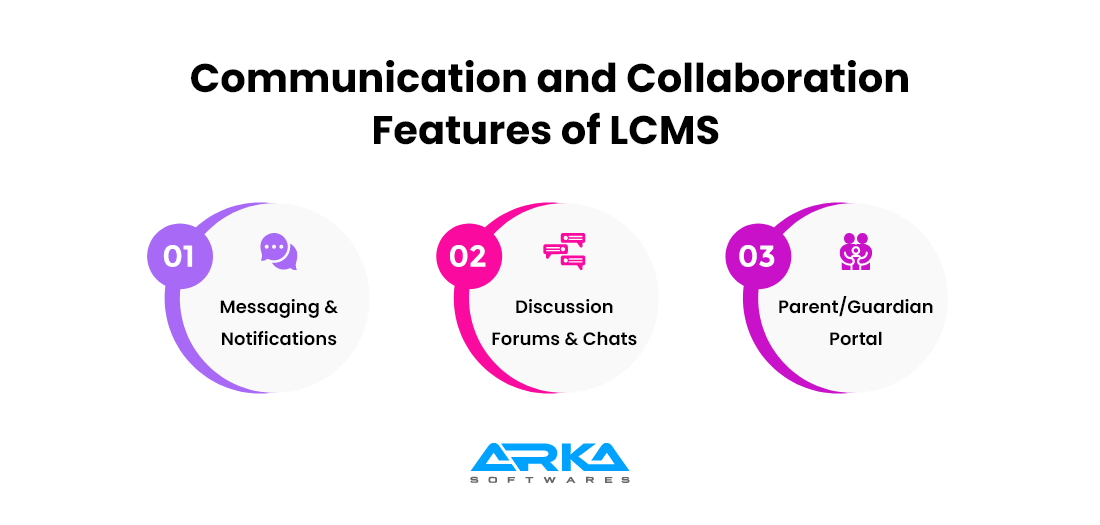
AI-powered capabilities in learning content management system development improve automation, smart recommendations, personalized learning, and real-time translation experiences.
AI-driven semantic search helps in matching the intent of the user by going beyond searching for just keywords in learning content management system development. This helps users to locate materials and resources quickly.
AI can be used to automatically create quizzes, summaries, and full-length evaluations for pre-existing learning materials in learning content management system development. This will save a lot of educators’ time and improve the scalability of the content.
AI tutors can be available 24/7 and will assist in learning at every stage of their learning process with the help of learning content management system development. The AI-powered chatbots will provide support, immediate responses, and guidance by simulating human-like teaching.
AI will help in real-time translation of the content. This real-time translation by AI can be achieved in multiple languages. This will help businesses globally as they will target a linguistically diverse audience.
AI algorithms will help in classification and automatic tagging of content which are new or being updated. This will help in simplifying content management and enhancing the search capacity of the learning content management system development tools.
The AI-driven methods will evaluate the emotional state and the engagement of the learners. This can be done by analyzing the tone and facial expressions of the learners and providing real-time feedback.
The features of this AI help in dynamically adjusting and categorizing questions based on the learners’ responses. This will ensure a personalized evaluation process.
This AI feature will improve learning efficiency and engagement of the learners by recommending personalized content for learning. This will be done by analyzing the patterns of learners based on their past performance, preferences, and behavior.
For learning content management system development, it is essential to have an appropriate technology stack for safe, secure, high-performance, and scalable learning.
Database (Management & Updating)
Frameworks (Design & Development)
Cloud Services (Storage, Computing, & Machine learning)
Backend (Programming Languages)
Frontend (Providing Interactivity)
Learning content management system development is done at Arka by designing an agile strategic approach to make sure your solution adapts to learner and business demands over time.
The needs of the organizations are reflected in this process. This includes our vision, aim, goals, target users, objectives, and functional requirements. This step is necessary for clear alignment of our goals and the features of the learning content management system development for the smooth foundation of the project.
In learning content management system development, UI/UX design enables us to achieve one of our goals to have a user-centric interface, which is responsive and intuitive. The priority is given to smooth navigation and accessibility.
The agile technique helps us to develop separate and distinct backend and frontend components. This enables us to build a scalable and modular system. This allows quicker iterations, flexibility, and implementation of essential features of learning content management system development tools effectively.
AI capabilities are integrated in this step of learning content management system development to have an automatic system for personalized learning. This helps in improving the functionality and compatibility of LCMS tools.
A thorough testing is done in order to ensure the security, performance, functionality, and cross-device compatibility. The team makes sure that the learning content management system development is stable, reliable, and prepared for real-world practical usage.
The finished product, after thorough testing, is launched on a secure cloud server with complete documentation. As we develop Learning Management System solutions, our services are available 24/7 for technical assistance and continuous monitoring to guarantee smooth and uninterrupted operation.
Learning content management system development is divided into three categories, as per their cost: Basic, mid-level, and advanced level.
An advanced-level custom-built learning content management system development is ideal for big businesses and institutions.
They can cost between $80,000 and $140,000.
This will be fully customized and will be built as per the needs of the enterprises, and will have a completion time of 6-10 months.
Functionalities will include adaptive learning and chatbots, which are core features of AI.

Arka Softwares helps in learning content management system development by providing solutions that meet all the learning objectives and combine them with AI capabilities and user-friendly UX design.
At Arka, we have a team of experts who design a learning content management system based on customers’ needs and have a user-friendly UI/UX design. The team has expertise to create scalable architectures integrated with AI learning capabilities.
The team helps in achieving the goal of the organization, whether it is a small organization or a big enterprise, and ensures efficiency and effectiveness in developing a learning content management system.
Arka built systems that follow standards and regulations such as SCORM and ADA. This makes our learning content management system development safe, secure, and can be deployed globally.
We provide the latest updates to the learning content management system development tools. Continuous maintenance and bug resolution for proper functioning and enhancing performance.
Choosing an app that best meets the requirements and demands of an organization is based upon a thorough understanding of how the application works. An application helps organizations and academic institutions to handle their reporting, management, tracking, and learning administration.
In order to have proper planning and management, it is necessary to have easy access to information and data.
Now is the ideal time to invest in a modern Learning Content Management System. Partnering with a professional LMS Development Company can open the door to highly impactful digital learning experiences that are scalable and future-ready.
Whether you are an educational or training provider, having a customized solution with integration to AI and gaming will help in the efficient delivery of education.
An LMS mainly focuses on tracking and course delivery. An LCMS concentrates on creating content and management.
Healthcare, education, government, corporate training, and many more.
Yes. The majority of LCMS platforms can be easily integrated with the help of APIs.
Usually, it takes 4 to 10 months, depending on the need and complexity of the organization.